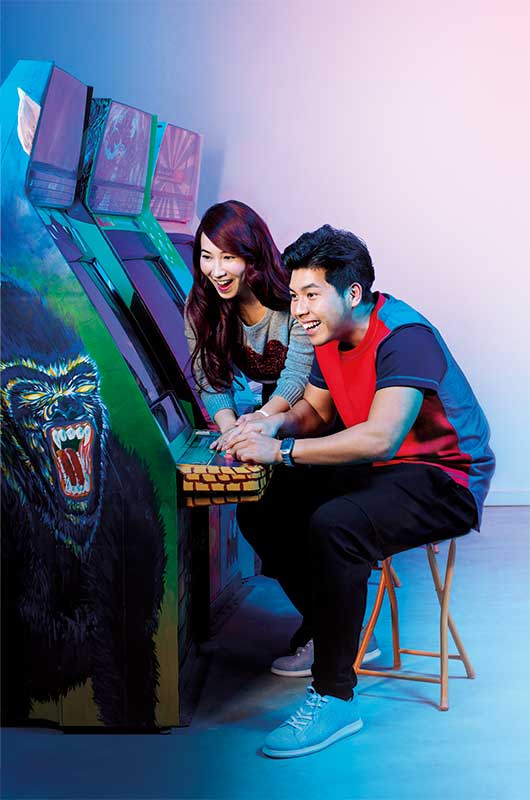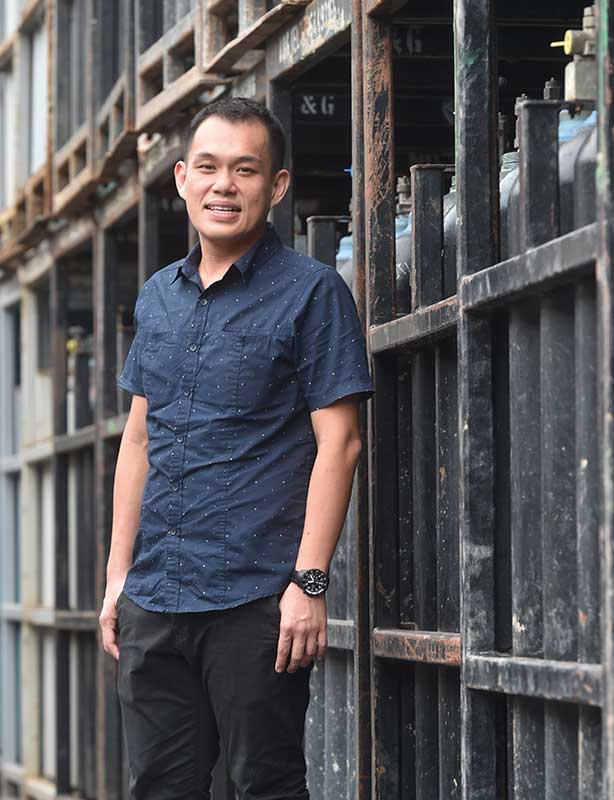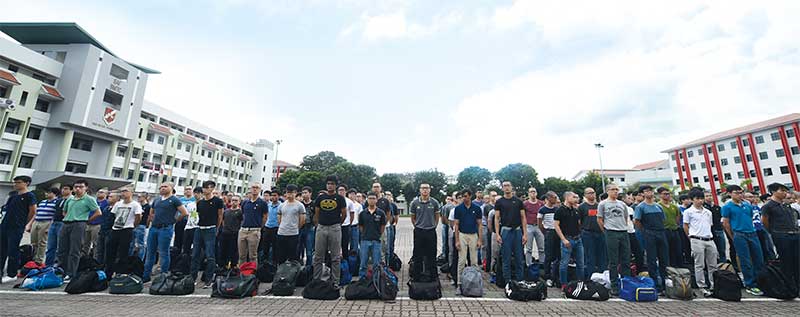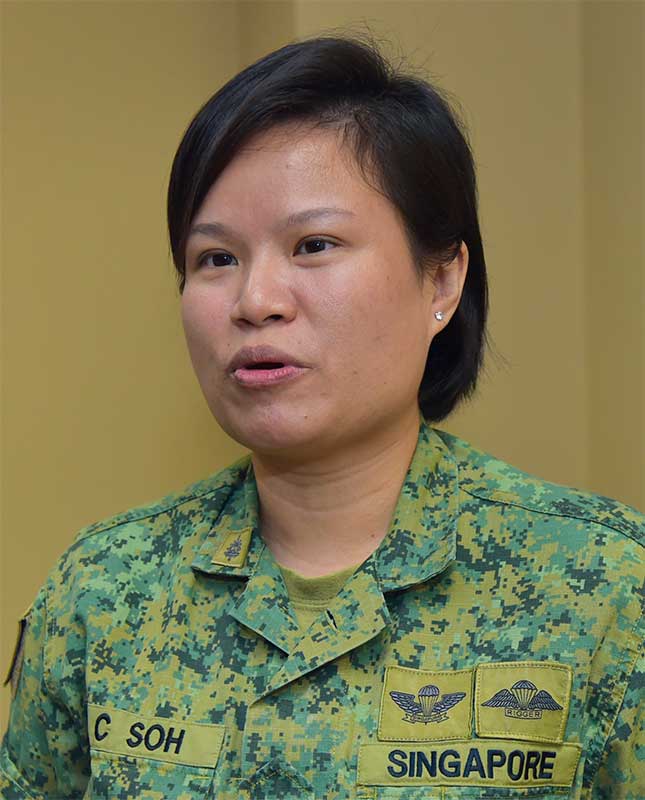From father to son
Father-and-son duo Military Expert (ME) 3 Shahabudeen A.L. and 3rd Warrant Officer (3WO) Mohamed Rilwan s/o Shahabudeen give their take on what Total Defence means to them and how they spread the message to others in their lives.
What memories do you have of Total Defence?
ME3 Shahabudeen: When I was young, memories of the Japanese occupation were still very vivid among the older generation. We were also warned about possible attacks after the MacDonald House bombing in 1965.
Every time these stories were told, the older folks would remind us to do our part as soldiers so that Singaporeans would never go through such tough times again.
3WO Rilwan: During secondary school, teachers took my class to the Changi Museum, Chapel and Beach, where they told us about the Sook Ching massacre. Unfortunately, I didn't pay much attention back then.
The next time I was there, I had just been posted to my unit. Having gone through tough military training, I saw the sacrifices of our forefathers in a new light. I had a greater appreciation and deeper understanding of what they had been through and what they had fought for.
Do you teach your children about Total Defence?
ME3 Shahabudeen: It's more through how we behave. If somebody needs help, help them. These are things that we, as parents, normally do, hoping that our children will follow suit. It would be awkward if I made Rilwan sit down and listen to a lecture on what Total Defence is about.
3WO Rilwan: Since young, I've always been passionate about the Army. I joined the National Cadet Corps during my secondary school days and signed on soon after I enlisted. I want to make sure that my daughter understands the importance of Total Defence through my actions.
Sometimes, actions matter more than words. For instance, on the topic of respecting all races and religions, my daughter watches my example of how I talk to and treat people of a different race or religion.
How do you think you can help the younger generation better understand Total Defence?
3WO Rilwan: Through visuals, graphics and interactive platforms. Last year, our unit went to The Future of Us exhibition. It was very interactive and my full-time national servicemen were all very interested.
Talking about the current global situation is also a good way to educate them. When they see attacks taking place in other countries, it is an opportunity to make them reflect on questions like "What if it happens in my country? What if the victims are my family and friends?" Inevitably, they'll feel that they want to protect the country.
ME3 Shahabudeen: Every time a bad situation or an attack happens, it's an opportunity to ask my men what their reaction would be and how it could have been handled better. Getting them to exchange ideas and discuss how they would handle the issue also allows me to understand them better and steer them in the right way if needed.
Be an everyday hero
"Sir, sir, are you ok?" yells a man as he forcefully taps the shoulders of the unconscious person who has collapsed.
After checking and finding that the person's breathing has stopped, he immediately administers Cardiopulmonary Resuscitation (CPR). "One and two and three and four, and one "
This can happen to anyone, anywhere and at any time, and is the reason for the Singapore Civil Defence Force's (SCDF's) Community Emergency Preparedness Programme (CEPP).
Since 2003, the SCDF has been conducting this free course for the public to learn basic life-saving skills such as first aid, CPR, automated external defibrillator (AED) usage and firefighting. The CEPP aims to build up a community of first responders who are trained to save lives.
Having a community equipped with such skills can help mitigate damage to lives and properties in times of emergency before the arrival of professional emergency responders, said Assistant Director of Volunteer and Community Partnership Department (Community Preparedness & Response) Lieutenant Colonel (LTC) Bob Tan.
The 45-year-old added: "In many emergency situations, prompt bystander intervention can prevent dire consequences and make that vital difference between life and death."
Better prepared than sorry
The CEPP is conducted once a week, with the number of participants capped at 30. It comprises an
e-learning module, a three-and-a-half hour basic theory and practical lesson, and an optional advanced module.
For CEPP trainer Lieutenant (LTA) Hassan Bachek, training his students gives him immense joy as he knows that they are walking away with a useful set of skills. The 57-year-old has been conducting lessons since last March and his students come from all walks of life, ranging from hawkers to maids to office executives.
"These people are neighbours, friends and colleagues I hope (through the course) they will know what to do during an emergency, be more willing to volunteer their services, and give assistance to those in distress."
Apart from participants expressing their appreciation to him for conducting the course, his greatest job satisfaction comes from hearing about how his former trainees saved lives.
"When we hear stories or read in the news that our former trainees saved lives or properties and they attributed their success to the CEPP, we feel like we were part of the team too," said LTA Hassan with a smile.
After attending the course, 24-year-old Nizan Bin Sofian felt that he, too, could now save lives during an emergency instead of being clueless and waiting for the ambulance to arrive.
When asked if he would introduce the programme to his family and friends, the ITE College East student said: "Definitely!
The CEPP is a very useful programme which teaches us basic life-saving skills. You never know when you might need to use them one day."
How to save a life
With global terrorism on the rise, being equipped with basic life-saving skills is more crucial than ever. Since November 2016, the CEPP has been revised to incorporate counter-terrorism elements so that people will know what to do during an attack.
For instance, the public should run or hide from the attacks and provide information to the police. Where possible, they should also perform improvised first aid on critically injured casualties to help save lives.
Emphasising the importance of a resilient community, LTC Tan said he hoped that more people would sign up for the CEPP so that they could help save lives and be prepared to deal with any emergency.
"The collective response of a trained community is, in itself, a reflection of community resilience and our stance against the scourge of terrorism," he said.
What you can learn from the CEPP
Tier 1: "I AM SAFE"
An online e-learning module consisting of a quiz. Participants will receive an e-certificate of participation upon completion. Visit www.scdf.gov.sg/iamsafe
Tier 2: "RESPONSE READY"
A 3.5-hour theory and practical lesson. Participants will be taught "Triangle of Life" skills (which include basic first aid, CPR and AED procedures, and basic fire fighting) and given an overview of SGSecure.
Tier 3: "LIFESAVER"
(Optional advanced module) A four-hour theory and practical lesson. Participants will be equipped with comprehensive lifesaving skills and emergency preparedness procedures including advanced first aid, two-man CPR, infant CPR, fire evacuation procedures, in-depth fire safety knowledge and decontamination procedures.
To find out more details or sign up for the CEPP, visit https://mindef.sg/ceppsignup
With heart and soul
At first glance, the restaurant looks like a huge living room. The decor is homely with a red leather sofa, throw pillows and a coffee table. The layout is spacious with only one long table and a few smaller ones.
Two young ladies are serving food to a table of diners. Clad in red tops and black pants, they are on their feet the entire time, patiently attending to their customers with smiles on their faces. It is a busy afternoon at Soul Food Enterprise.
Unlike your regular servers, these two ladies have learning disabilities. One of them is 24-year-old Cheryl Png, the daughter and inspiration of Soul Food's founder Gerald Png.
When Cheryl was 12, Mr Png discovered her flair for cooking. A self-taught cook, he decided to pass his culinary skills to her. It was also then that he decided to train young people with special needs in various areas of the Food and Beverage industry.
"At Soul Food, our mission is to equip them with skills, and be that first safety net of employment for them," said the 58-year-old.
Nurturing hands
Trainees are taught through one-on-one sessions for a period of up to two years. To reproduce a dish, they have to first learn through observation and application.
For instance, Mr Png would hold a trainee's hands and teach him or her how to crack an egg. This process is done several times so that he or she eventually understands what this action means on the recipe.
Mr Png explained: "They all learn differently as the way they process information is very different. They have to see it, apply it and then do it."
Since the opening of Soul Food in 2008, Mr Png has taken in 20 trainees. Currently located at the Enabling Village (a community space dedicated to integrating people with disabilities into society), the restaurant has a staff strength of 12, nine of whom have special needs and are his main workforce.
The cutting of ingredients, preparation of sauces and cooking of food are all done by them, just like how things are done in any other commercial kitchen. The only difference? Their work is tailored to them.
For instance, one of the staff has autism and is easily distracted by the sound of popping oil. Instead of putting him in charge of frying, Mr Png assigns him other roles such as baking.
"We try to look at their competencies and strengths as opposed to focusing on the things that they can't do," said Mr Png.
Building confidence
At Soul Food, you can only find daily set menus. Serving up home-styled modern European cuisine, the restaurant offers set lunches at $30 nett.
"Knowing that there is a soup, main course, dessert and coffee or tea gives the staff a sense of control and they are better able to contribute to the flow of operations," said Mr Png.
"With their skills, they will have the confidence and competence, and from the competence comes the product."
To 24-year-old Felicia Lee, Soul Food is like her second home. Since starting work about four years ago, she has learnt to cook and serve guests. Her roles in the restaurant include preparing ingredients, making sauces, cooking soups, showing guests to their tables, serving and washing.
"I'm happy working here and I'm proud that I can prepare the food, and do the clearing and washing," said Ms Lee, adding that she sees herself working at Soul Food for a long time.
Not just a one-man show
Mr Png is currently training a second team of staff and once they are ready, both teams will alternate their workdays.
But it is his hope that more like-minded organisations can join this social calling and make Singapore a more inclusive society.
There needs to be a change of mindset to see that people with special needs can be contributing members of society, said Mr Png.
"We have to move from tolerance to inclusion, to wanting to understand them and seeing how they can contribute. It's not only about those with special needs, but also the elderly and ex-offenders.
"It is only then that Singapore will become a truly better place for all."
Did you know?
Mr Png wrote and composed the original Total Defence Song There's a Part for Everyone in 1984!
Soul Food Enterprise
20 Lengkok Bahru, #01-10
Opening hours:
Tuesday Friday:
12pm - 2pm, 6pm 10pm
Saturday: 9am - 10pm
(reservations only)
Closed on Sunday, Monday & public holidays.
Set lunches at $30 nett.
Dinner by reservation only, min $55 nett per person.
For more info and daily set lunch menus, check out
their Facebook page: mindef.sg/SoulFoodEnterprise
Ahead of its flavour
It may seem a simple combination of pork floss, mayonnaise and buns, but its creation took Singapore by storm. That was 16 years ago and till today, the Flosss still remains the bestseller of local bakery and food chain BreadTalk.
Wanting to change how bread-buying was done, BreadTalk founder George Quek decided to set up a bakery with an open-concept kitchen.
Instead of just grabbing buns off shelves, consumers could see through glass panels how the baking was done, and bread-buying became an opportunity for browsing. This was also why the Flosss bun looks the way it does.
"In the past, the filling was mostly hidden in the bun. But we wanted everything to be open-concept, so we decided to coat the floss on top of the buns so that people would know what they were enjoying," explained Senior Manager of Brand Development Joanne Wong, 36.
Putting S'pore on the map
This spirit of innovation and entrepreneurship was what drove the bakery chain to expand its branches into other countries, including China and Indonesia. Today, it has more than 850 bakery outlets across Asia and Middle East.
Since its launch in 2000, BreadTalk has also moved into managing various eateries which include ToastBox, Food Republic and Din Tai Fung.
Besides putting Singapore all over the world map, the bakery is now a familiar brand that both Singaporeans and foreigners trust.
Ms Wong said: "People tend to associate Singapore brands with stringent quality control and they feel safe consuming food from a Singaporean brand."
Venturing into foreign markets came with its fair share of challenges, the greatest being differences in culture and taste.
Tastes that work locally may not be suitable in other countries, and BreadTalk allows each market the freedom to develop flavours suited for them.
However, each new flavour goes through the Research and Development (R&D) branch in Singapore so that BreadTalk is able to maintain keen oversight.
The brand has won many accolades over the years. Breadtalk was the first Singaporean brand to win the "Growth Market Retailer of the Year" at the World Retail Awards 2014. It was also awarded the "Five Star Diamond Brand Award" by the World Brand Laboratory Award in 2015.
What's trending
To keep up with trends, the bakery chain often engages famous bakers from countries like Japan and Taiwan as consultants.
Such collaborations allow their bakers to learn new techniques and co-create innovative recipes like the Hokkaido snow roll and the rice chiffon cake, which have since gone on to become signature products of BreadTalk.
"We constantly work with renowned chefs from overseas to come up with new products. This also provides opportunities for exchanges among our own R&D chefs and bakers," said Ms Wong.
"Trends are changing all the time, so we always want to surprise our customers. To keep things fresh, BreadTalk introduces a new retail concept to customers every three or four years. Whenever we launch a new concept outlet, more than 50 new recipes will be churned out as well."
Nurturing the next generation
Aside from being one of the leading bakery brands in Asia, the company nurtures young and aspiring bakers.
In February 2015, BreadTalk collaborated with tertiary institutions such as ITE College West and the Asian Culinary Institute to allow students to train at the bakery while still studying.
This programme gave them a chance to hone their skills and gain a deeper understanding of the baking industry. After graduation, the students were offered the opportunity to continue their employment with BreadTalk.
The home-grown brand has come a long way but ultimately, it is the continued support from Singaporeans that drives the company.
Calling their growing base of loyal customers a confidence booster, Ms Wong said that the brand intends to continue bringing happiness through their buns and have more breakthroughs in creativity, innovation and differentiation.
Said Ms Wong: "Over the last 16 years, the buns at BreadTalk have become part of the Singaporean lifestyle and we are grateful to all our supporters."
To reward their customers who have been fans since day one, the bakery will be rolling out more consumer engagement programmes this year. They will also be looking at a digital transformation for retail outlets, such as putting up self-service kiosks, to improve the buying experience.
Drink & never give up
It's the day before a new school term and a young boy is feeling anxious about returning to school. Noticing his listlessness, his mother asks him if he's feeling alright, but he does not reply.
The next day, she slips a MILO packet into his bag with a handwritten note that says: "Make a new friend today. Go for it! Love, Mum." After reading the note at school, the young boy plucks up the courage to make a friend and he becomes happy.
This was a back-to-school campaign MILO Singapore ran in December 2015. With the hashtag #MiloGoForIt, the beverage brand used MILO as an enabler for mums to give their kids the confidence to return to school.
Perseverance and courage
Assistant Brand Manager of MILO Singapore Daphne Lim revealed that prior to the campaign, the team did a lot of in-depth social listening and learnt the fears that both mothers and children face about the latter going back to school.
"The children are very anxious about new teachers and making new friends, and the mums worry if their children are able to concentrate or whether they have the energy to go through the entire day."
With that, the 27-year-old and her team decided to give out stickers for mums to write encouraging messages for their children and paste them on MILO packets. The move was a hit and more parents started requesting stickers through MILO Singapore's social media channels.
Ms Lim added: "We also asked parents to send us pictures of themselves with their notes of encouragement for their kids. (When) they did, we saw a lot of creativity and it was very heart-warming."
Following the success of that campaign, MILO Singapore launched another campaign touching on a major milestone of a student's life the Primary School Leaving Examination. Featuring the hashtag #NeverGiveUp, the brand wanted to send the message that school is about more than grades, and remind parents that it is also important to help children be more resilient by instilling values of perseverance and confidence in them.
National pride
A firm believer in promoting perseverance, confidence, teamwork and courage among children and the youth since the 1960s, MILO Singapore saw sports as a way of inculcating these values.
After a taxing sports day or cross-country run, the MILO van is a sight for sore eyes, and most Singaporean students are probably guilty of gulping down more than their fair share of the cold, creamy malt cocoa.
Today, the beverage brand has come a long way from just supporting sporting events and National Day Parade rehearsals.
Last October, MILO Singapore supported local singer Nathan Hartono's finals in Chinese reality television singing competition Sing! China by arranging for MILO vans to distribute free drinks at three locations.
Mr Chow Phee Chat, Director of Marketing Communications and Corporate Affairs of Nestle Singapore, explained that the brand was moved by Mr Hartono's perseverance during the competition. "It's about the journey (and) the fact that he showed courage to take part in an international competition when he wasn't comfortable speaking Mandarin. Whether he won or lost did not matter He exhibited strong values that were good for not only children but all Singaporeans, so we felt that we should support him."
The 45-year-old also revealed that MILO Singapore is actively looking at pushing out positive messages that are relevant in today's society. "Singaporeans face a lot of challenges in the new world, and as an iconic brand of Singapore, MILO has a part to play in communicating messages that are good for the public."
He added that bringing out the importance of national pride is also something that MILO Singapore hopes to do on a greater scale.
SGSecure at your fingertips
On 24 Sep 2016, Prime Minister Lee Hsien Loong launched a national movement called SGSecure.
A nationwide response against the threat of terrorism, SGSecure puts the civil, social and psychological aspects of Total Defence into action within the community. It is also a constant reminder for citizens to stay alert, united and strong in order to respond and bounce back quickly from any crisis.
As part of the movement, the SGSecure app was launched to alert the public of potential threats via mobile technology. Users can easily report suspicious activities to the police by just taking a photo, describing the scenario and sending it out. The app can also alert the public to a threat at a particular location.
In addition, a new location-based SMS public alert system will allow the police and the SCDF to send text-based localised SMS alerts to mobile phones in the vicinity of an attack. Apart from warning residents about the danger, the SMS will provide appropriate advice on how they can and should respond.





